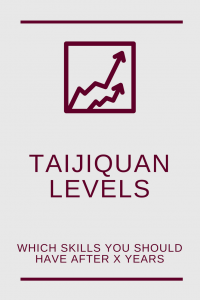In Taijiquan, there is a lot of talk about “levels”. There are no belts like in Karate or other martial arts, so it is really hard to tell how good someone is.
So you might hear things like “after 1 year you should already have these kinds of capabilities” or “after 10 years you surely understand this aspect” or “after 20 years you are likely at this level”.
And what if you haven’t reached those skills and Taijiquan levels yet? “Oh, obviously you simply did not practice right during the last years”.

That’s all BS.
I realized that when I had a look at my children. My son is now 5 years old and well – in some areas he is “behind” others boys at that age. But guess what: there is NOTHING he or I or anyone else in the world can do about it. He is just on his own path.
And I think almost everyone with kids understands that.
But why do so many think, that as an adult we should all develop at the same tempo. Or at least have reached the same level of capabilities after 5, 10, 20 years of practicing Taijiquan?
Besides the thing that we all develop at different pace (like I explained with my son), there are so many other reasons why we evolute differently.
Some Taijiquan people come from years of practicing Karate, others from years of Ballet, others from years of not moving at all.
Some Taijiquan people come with pain, others are considered “healthy”.
Some start in their 20s, some in their 40s, some in their 60s, …
Some practice 8 hours per day, others practice 1 hour per week.
Some love Push Hands, others just not so much.
I am sure there are gazillions more aspects in which we are unique.
So I really urge you: NEVER JUDGE SOMEONE ELSE BASED ON HOW LONG THEY HAVE PRACTICED TAIJIQUAN.
Don’t be impressed by someone who is practicing Taijiquan for 10,15,20,30 years already. And don’t look down at someone who just started last month. We all move on our own rate. We even enjoy the slow movements of Taijiquan, why not enjoy a slow evolution in our skills! Consider it as just another lesson in patience.
“Patience and Tai Chi. If you persevere in practicing the principles, achievement will come. You can’t force it; you can’t make it happen. “Gradually, gradually”. You must be patient.”
(Cheng Manqing in “There are no secrets”p. 8)
You learn at your own pace. Just continue practicing and over time you will feel the change. There are no Taijiquan levels you must reach at any time. While you are on your way, on your own very personal path: NEVER COMPARE YOURSELF TO SOMEONE ELSE.
Fully enjoy your own Taijiquan evolution.
Happy Qi!
Angelika
Just in case you want to read more about Taijiquan levels, I recommend this – beware there are a lot of very mathematical calculations, graphs etc! How to calculate your Tai Chi skill level

The standard and martial skill requirements for each level of kung fu will be described in the following sections. It is hoped that with these, the many taijiquan enthusiasts all over the world will be able to ‘assess’ on their own their current level of attainment. They will then know what they need to learn next and advance further step-by-step.
Thanks for your enlightening thoughts.
I loved the link to the calculator, I guess some masters would disagree with it, especially for styles outside Yang style or affiliated. Depends where you start from, it can breathe from belly or not, flexibility level, …. Also there are some accelerator tricks: train fa-jing or a complimentary art like pakua and the slope will be steeper with less amount of training.
Anyway it all comes to why you practice taijiquan. I am interesting in how the body can control the mind. A complete research subject.
yes, the calculator is interesting. And I guess that one simply cannot do all that training without knowin WHY to practice Taijiquan. Everyone has his/her own reasons, though they are usually very simliar.
Hm, which following sections do you mean?